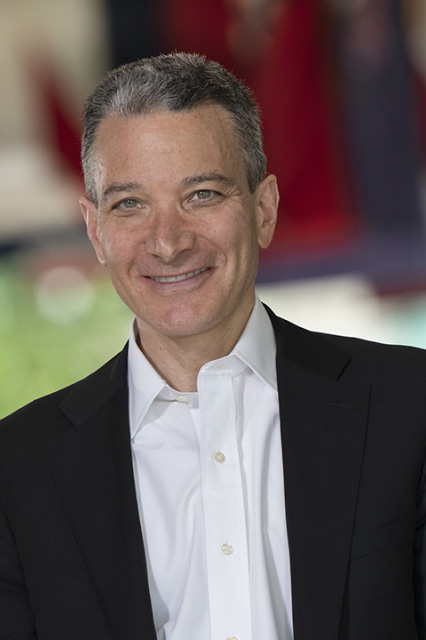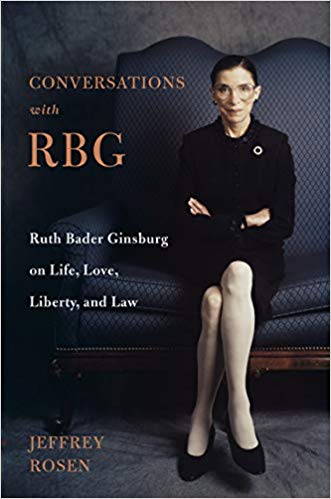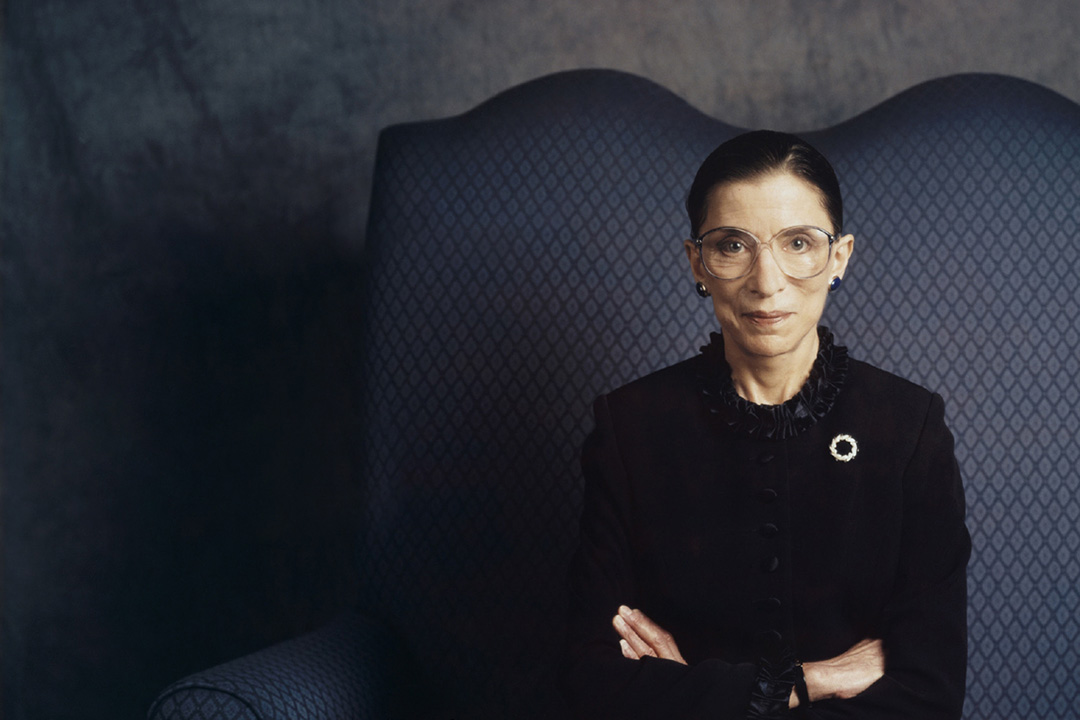President of the National Constitution Center and Professor of Law Jeffrey Rosen's new book, Conversations with RBG: Ruth Bader Ginsburg on Life, Love, Liberty, and Law, looks at the life and legacy of Supreme Court Justice Ruth Bader Ginsburg. Told through personal vignettes of conversations with RBG, Professor Rosen builds  upon onstage conversations between himself and Justice Ginsburg with essays on her influence and legal mind.
upon onstage conversations between himself and Justice Ginsburg with essays on her influence and legal mind.
In a book review in The Washington Post, Julie Cohen, director of the Emmy Award-winning documentary "RBG," said the book "makes you feel like a student in the world’s coolest law school seminar, with Ginsburg and Rosen deftly leading you through constitutional clauses and case law to elucidate how the court works and why it matters."
Q: What inspired you to write this book?
Jeffrey Rosen: Knowing Justice Ginsburg has been one of the great blessings of my life. The conversations we've had over the years about opera, about life, about liberty are among the most meaningful I've ever experienced. Those conversations took place in a whole bunch of different settings from the elevator where I first met her as a young law clerk at the US Court of Appeals, to public conversations that I conducted as a law professor, as a legal journalist, and at the National Constitution Center. About two years ago, I realized that there was such wonderful material and that it showed Justice Ginsburg so uniquely and so authentically. These conversations are ones where she expresses herself in her own voice with such truth and empathy and clarity. I was honored to conduct the conversations, and they just seemed to be a shining inspiration for people everywhere so they could see this great hero talking about everything from raising kids to interpreting the Constitution.
So I went to her and asked if she would support collecting them into a book and of course, I was thrilled when she said yes.
It was the culmination of a dream. Bringing the conversations together was an act of tribute and devotion to my personal and Constitutional hero, and it's so meaningful that people are responding to the conversations, that they're being inspired by her life lessons. She teaches us how to live a fully productive and empathetic life because she's the most disciplined and focused and empathetic person anyone can imagine.
 Q: How did you meet Justice Ginsburg?
Q: How did you meet Justice Ginsburg?
JR: I had the remarkable experience of meeting Judge Ginsburg in an elevator. It was 1991. I was a young law clerk on the US Court of Appeals in DC, and I saw her in the elevator as she was coming down from an exercise class called Jazzercise. She was a formidable figure, standing there in the elevator in silence. I thought I had to break the ice, and I couldn't think of anything else to say, so I said, "What operas have you seen recently?" I didn't realize she was an opera fan but it turned out it was the right question because she really loves opera. We just began to talk about opera throughout the year and began this conversation about our shared love of music.
Q: What is one piece of advice RBG gives to readers in the book?
JR: Justice Ginsburg gave me a piece of advice to give to my two sons, but I think it's applicable to all of us. She said with enough hard work, you can achieve your dreams. She said you really have to put in the time and discipline to achieve your dreams and through that, you can do whatever you set your mind to do. She has astonishing powers of focus and concentration and self-discipline. She often says that her mother taught her to overcome unproductive emotions like anger and jealousy because they are distracting. She told me that she realized that if we do not overcome unproductive emotions, we will lose precious time for productive work. Seeing her live a life so greatly in the law—how can you imagine a more productive and empathetic life—transforming the nature of America and helping to make women more equal as well as bringing light and justice to the individual plaintiffs that she represented is truly inspiring. And throughout, you can see her drive and unmatched work ethic and self-mastery.
Q: What do you hope readers take away from the book?
JR: I hope readers will take away a sense of being as inspired as I am by her personal and Constitutional greatness. I hope they will be inspired personally to be better people, to try to exemplify the values that she exemplifies more powerfully than anyone I've ever met as well as being inspired by the Constitutional vision of the greatest hero of gender equality of our time. There's no one who's done more to enshrine the ideal of equality for women in the Constitution than Justice Ginsburg.
Q: Do you have a favorite chapter or conversation in the book?
JR: My favorite conversations were the ones about music. I asked her once, why is music so important to you? Does it take you outside of your self? For her, it does. She said when she's listening to an opera, she can't be thinking about the brief or the opinions she has to read or write because she's focusing on the music and the story. And I think that's why music for her and for many of us is just such a form of communion with something much larger than ourselves. It has been a great pleasure to share that with her.
Q: Why should law students pick up your book?
JR: The book is full of Justice Ginsburg's legal opinions told in her own words. The great RBG shares about her Constitutional vision and she shares the details of cases she would like to see overturned, like Shelby County v. Holder, the voting rights case. She talked about the details of why she thought they were wrong.
I asked her what decisions she most wanted to see overturned, and she identified Citizens United v. Federal Election Commission, Shelby County v. Holder, then the part of the Affordable Care Act decision that restricted Congress's power under the Commerce Clause, and finally Gonzales v. Carhart, the partial-birth abortion case. It was very striking to hear why she thinks these cases were absolutely wrong.
In the end, all of our conversations were full of life lessons and full of lessons about the Constitution. She is one of the greatest defenders of the Constitution of our time. I hope law students will be both inspired by her Constitutional vision and also by her shining personal example of how to live a good life, full of empathy for others and devotion to the rule of law.


